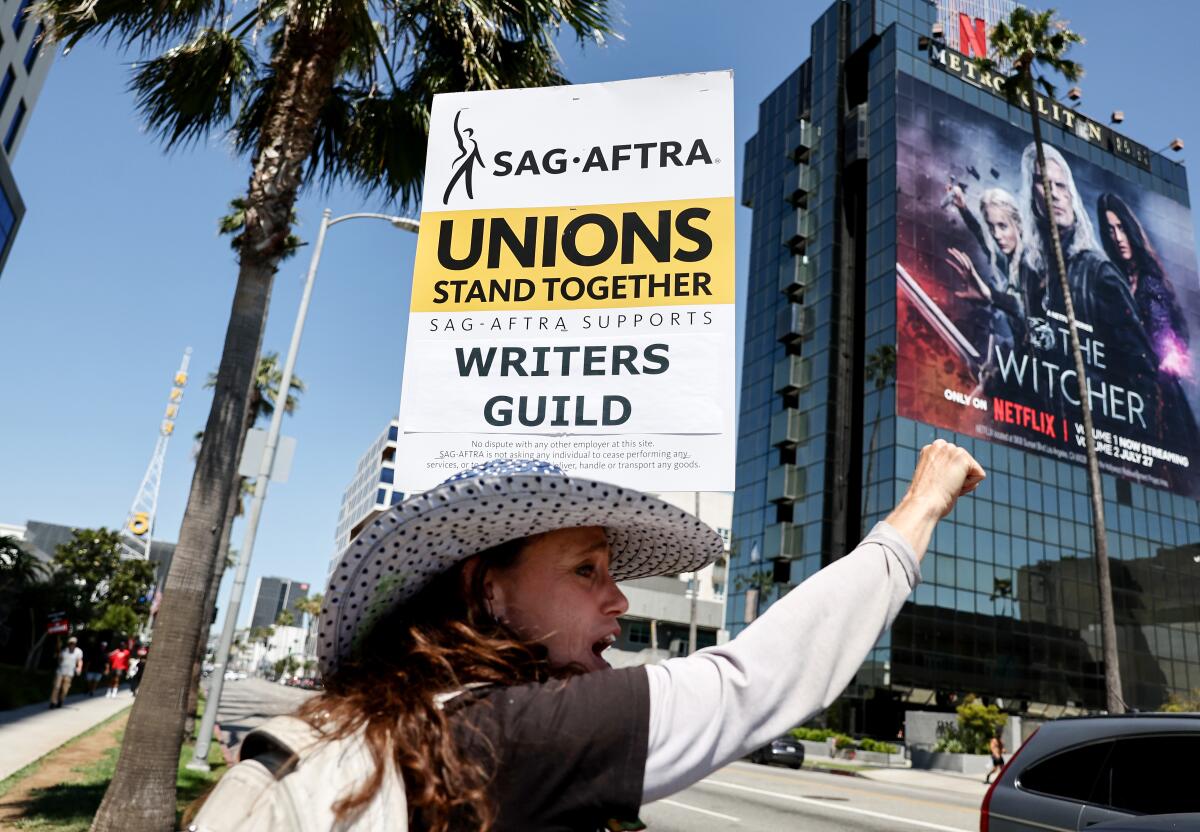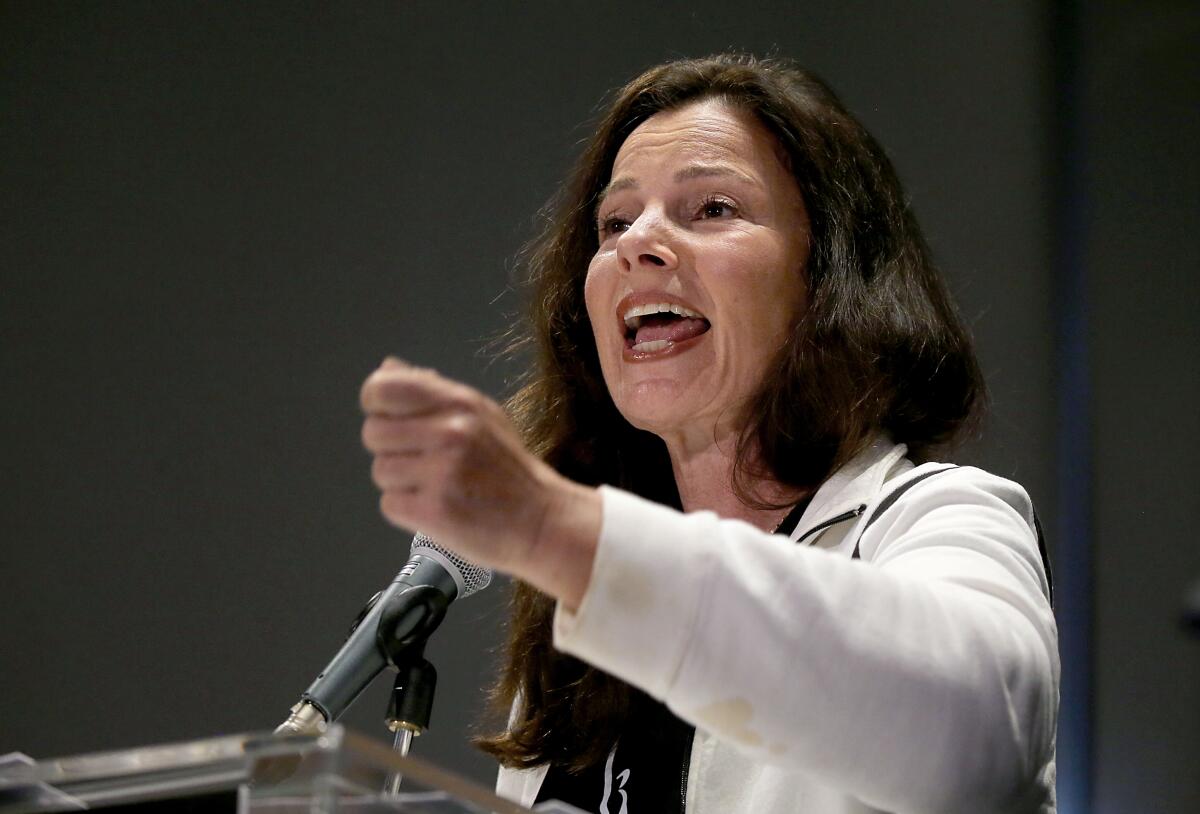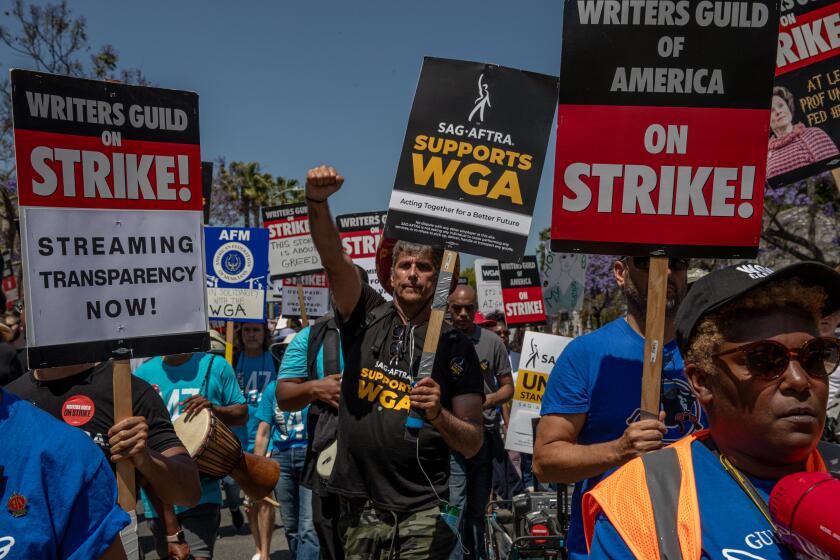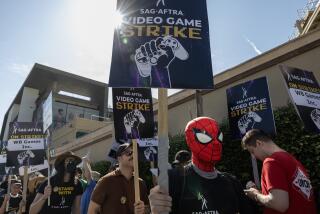Hollywood actors’ union SAG-AFTRA votes to strike. ‘We are the victims here.’

- Share via
SAG-AFTRA’s national board of directors on Thursday voted unanimously to approve a strike action by tens of thousands of Hollywood actors, widening the scope of labor unrest in an entertainment industry that is already facing numerous headwinds.
The vote came after negotiations between the actors’ union and the major studios failed to reach an agreement on a new film and TV contract.
Actors — similarly to screenwriters already on picket lines — have been battling studios for a pact that would deliver far better pay and residuals from streaming and address other issues, including the use of artificial intelligence, that have been roiling the entertainment landscape.
Despite the last-minute involvement of a federal mediator, the 160,000-member union was unable to secure a deal with the Alliance of Motion Picture and Television Producers, which represents studios in labor dealings. The old collective bargaining agreement expired Wednesday night without a deal in place.
Union leaders announced the board’s vote at a noon news conference in Los Angeles.
“We are the victims here,” SAG-AFTRA President Fran Drescher said during a fiery speech. “We are being victimized by a very greedy entity.

“I’m shocked by the way the people we have been in business with are treating us. It is disgusting. Shame on them. They stand on the wrong side of history at this very moment.”
Inside the business of entertainment
The Wide Shot brings you news, analysis and insights on everything from streaming wars to production — and what it all means for the future.
You may occasionally receive promotional content from the Los Angeles Times.
The studios said the union walked away from an offer that included “historic” increases in pay and residuals, as well as a “groundbreaking” proposal for AI protections. The group said its offer included a requirement for a performer’s consent for the creation and use of digital replicas or for digital alterations of a performance.
“A strike is certainly not the outcome we hoped for as studios cannot operate without the performers that bring our TV shows and films to life,” the AMPTP said in a Thursday statement in response to the union’s strike declaration. “The Union has regrettably chosen a path that will lead to financial hardship for countless thousands of people who depend on the industry.”
The board’s vote clears the way for the union to begin nationwide pickets starting Friday and deepens the labor strife that has disrupted Hollywood since scribes represented by the Writers Guild of America went on strike on May 2. The actors’ strike begins at midnight.
The strike is expected to grind even more productions to a halt and make it difficult for studios to promote upcoming films and TV shows, with SAG-represented actors unable to do press interviews for their projects, attend premieres or go to film festivals.
It marks the first time in 63 years that both actors and writers have been on strike at the same time as Hollywood grapples with issues over how talent is compensated in the streaming era.
The union has been pushing for an increase in minimum wages to counter the effects of inflation. The actors also want increases to streaming residuals — royalties for when TV shows and films are replayed — and for their members to participate in the success of hits. They also want their health and pension plans boosted and desire protections related to the use of artificial intelligence, which has become an increasingly prevalent tool for studios and filmmakers.
SAG-AFTRA also pushed for curbs to the practice of self-taped auditions, which actors argue puts undue pressure and costs on performers trying to get work.
“The AMPTP has remained steadfast in devaluing the work of our members,” said Duncan Crabtree-Ireland, SAG-AFTRA’s chief negotiator. “A strike is an instrument of last resort.... Unfortunately, they have left us with no alternative.”
The AMPTP said it was disappointed, putting the blame on the union. The group said a strike would deepen financial harm for those dependent on the industry, which includes not just writers and actors but also prop warehouses, makeup artists and set designers.
AMPTP said the studios offered the union the “highest percentage increase” in guild minimums in 35 years, limits to self-taped tryouts and substantial increases in pension and health contribution caps, among other proposals. The group said its offers included a 58% increase in salaries for major role (guest star) performers on high-budget streaming programs and a pay increase of at least 11% in Year 1 for background actors, stand-ins and photo doubles.
A day after extending his contract as Walt Disney Co.’s CEO, Iger said he is open to spinning off ABC Television and taking on a partner for ESPN.
Walt Disney Co. Chief Executive Bob Iger, in an interview on CNBC, said that the expectations of the writers and actors are “just not realistic” and that their job actions are “adding to a set of challenges that this business is already facing that is quite frankly very disruptive and dangerous.”
The union leaders, however, said the AMPTP’s concessions were insufficient. Crabtree-Ireland specifically cited the studios’ AI proposal as offering inadequate safeguards, particularly for background actors. They also chafed at the notion that actors would be to blame for hurting the entertainment economy.
“This is where we drew the line in the sand, and it’s a terrible thing to have to do,” Drescher said. “But we were forced into it.”
Negotiations began June 7, ahead of which SAG-AFTRA secured a strike authorization from members with a 98% approval margin.
Ahead of the original June 30 deadline, Drescher said in a video message to members that the two sides were having “extremely productive” talks. However, that triggered concern from some of the union’s most high-profile members, including A-list stars, who wrote an open letter to leadership pressuring them not to settle for anything short of a “transformative” deal.
“We are concerned by the idea that SAG-AFTRA members may be ready to make sacrifices that leadership is not,” said the letter signed by Meryl Streep, Glenn Close and Ben Stiller. “This is an unprecedented inflection point in our industry, and what might be considered a good deal in any other years is simply not enough.”
The union was not able to secure a deal before last month’s deadline and extended the contract by 12 days to allow negotiations to continue until 11:59 p.m. July 12.
Hollywood is once again in the midst of a historic labor battle in which studios are facing a possible strike on two fronts in a protracted fight over new forms of distribution.
Earlier this week, the AMPTP requested assistance from a federal mediator, which SAG-AFTRA agreed to. But the relationship between the two sides appeared to have soured. The guild accused the AMPTP of leaking information about the mediation plan before negotiators were made aware of it, calling the move a “cynical ploy.”
More to Read
Inside the business of entertainment
The Wide Shot brings you news, analysis and insights on everything from streaming wars to production — and what it all means for the future.
You may occasionally receive promotional content from the Los Angeles Times.













